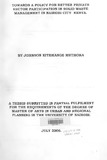| dc.description.abstract | This study is an attempt to come up with comprehensive policy proposals
aimed at improving private sector participation in solid waste
management in the city of Nairobi. It was felt that by reconciling findings
from the three main sectors that may influence how the private sector
performs in SW Min Nairobi (i. e. the households, the local authority and
the private sector) it would be possible to come up with workable policy
proposals aimed at better involvement of the private sector in SW Min the
city. It involved carrying out an investigation into the key domestic solid
waste generation parameters that may affect performance of the private
sector in SW Min the city, documentation of the efforts the City Council
of Nairobi; especially the environment department, is making towards
better involvement of the private sector in SW Min the city, and an
evaluative study on the operational capacity of the private sector in
providing SWM services in the city.
The study established that contracting which is currently being tried by
the city council is riddled with corruption and nepotism within the city
council. On the other hand low returns and difficulties in collecting user
charges hampers smooth penetration of the private sector into the very
poorzones of the city through open competition. Open competition is
also ruled out in such zones mainly due to lack of proper monitoring and
controls,which leads to illegal dumping of waste. As a result a three tier
process is recommended whereby contracting combined with normal city
council operations, use of Community Based Organizations (CBOs)and
awareness creation is carried out in the very poor areas, franchising is
used in the middle-income areas and open competition in the wealthy
zones. Franchising in the middle-income zones will ensure self regulation
among the franchised firms out of fear of losing their franchises hence
they are likely to be more cautious in their operations. Open competition
would work more efficiently in the wealthy areas where the willingness
and the ability to pay are well grounded. It is also likely to translate into
lower-charges. There is also need to support the private sector through
funding, lower taxes on equipment and training.
It is believed that the above proposals, if properly implemented, can lead
to improved performance of the private sector in SWMin Nairobi . | en |

